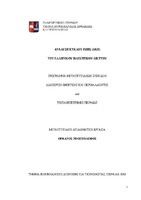Ανάλυση κύκλου ζωής (ΑΚΖ) του ελληνικού ηλεκτρικού δικτύου

View/
Keywords
Ανάλυση Κύκλου Ζωής (ΑΚΖ) ; Μονάδες παραγωγής ηλεκτρικής ενέργειας ; Ανανεώσιμες πηγές ενέργειας ; Δίκτυα ηλεκτρικής ενέργειας ; Περιβαλλοντικές επιπτώσειςAbstract
This paper presents a Life Cycle Assessment (LCA) and an effort for a qualitative and quantitative inventory of negative environmental impacts during the production and transportation of electricity in Greece. In order to complete the LCA, had to model the production networks and transportation of electricity, to collect data for the quantity of materials and energy that consumed in every step of the life cycle, to evaluate the method‘s results and to make an interpretation of possible negative impact that caused by the Greek electricity grid. Global Warning Potential (GWP), which is responsible for GreenHouse Gases (GHG) emissions, used as the main indicator for the environmental impact assessment for both networks. According to the analysis, the annual production and transportation almost 55 TWh of electricity, spends energy about 796.800 TJ (LHV) and releases into the atmosphere about 47.300.000 tons of CO2, for the total life cycle. The most polluting technology in the Greek energy mix is lignite power plants and followed by the oil power plants. At the third place are the units of natural gas. On the other hand for the RES, units of biomass have the highest score of emissions followed by photovoltaic and wind turbines. For validation and verification of the result, papers and researches from other countries have been used to compare the LCA results. Conclusively, Greece has the most polluting energy mix than other countries. Finally, there are some proposals to improve the environmental performance of the two networks, which can be used as an element for further research. Penetration of RES in production network and connection of the islands with a transportation network are some examples.


